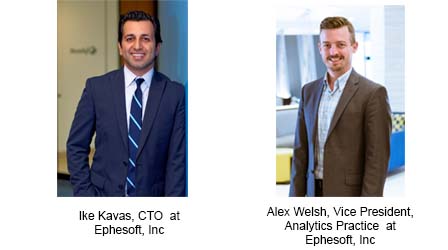Interview with Ike Kavas, CTO and Alex Welsh, Vice President, Analytics Practice, Ephesoft, Inc.
We sat down with two of the technology leaders at Ephesoft, Ike Kavas and Alex Welsh, to learn more about the advances of Commercial KYC (Know Your Customer) solutions for banks and financial institutions around the globe. Here’s what they said.
Q: Why is Commercial KYC important for banks?
A (Alex): Risk tolerance is an important factor here, but long story short: KYC is a vital component to any healthy commercial lending practice. Aside from the regulatory requirements to monitor and report on potential financial crimes, banks that do not have robust KYC programs and technology can lose a competitive edge in the market – especially for big commercial clients.
Q: How do banks and financial institutions use Ephesoft’s platform to uncover red flags?
A (Ike): Connecting multiple data points and cross referencing databases can show if customers or their suppliers or partners are involved in terrorist, illegal or at-risk activities. Big data analytics can find these outliers or anomalies and alert system users.
Q: Can you explain how Ephesoft can help with EDD or Enhanced Due Diligence?
A (Alex): The “enhanced” part of due diligence comes into play with larger institutional clients who are drawing bigger lines of credit, etc. This is where the banks require more third-party data from their customers – partnership agreements, supply chain contracts, anything that’s one or more level removed from the clients themselves. This amounts to large quantities of unstructured documents, which is where Ephesoft can help. Our machine learning technology can sift through the EDD content and extract the relevant information that the bank is looking for to support the KYC process.
Q: Can you describe how Ephesoft Insight’s mind maps help companies?
A (Ike): Visualization tools like our mindmap help analysts quickly see connections between data. Our algorithms put structure to unstructured data, and then users of our system can see how those data are connected. For example, in the world of trade finance and money laundering, our mindmap can show the user how one freight company is connected to an exporter suspected of fraud, and then see who else the freight company is connected to. This is powerful network analysis.
Q: What role does machine learning (ML) and artificial intelligence (AI) play in helping banks protect themselves?
A (Alex): Machine learning is gaining a lot of traction in the market today because of its ability to massively scale. This is particularly important for global financial services companies. We talked to one bank that has over 3,000 anti-money laundering analysts manually combing through unstructured data. Machine learning automates these types of tasks. Systems that leverage machine learning don’t need to be explicitly programmed, and they learn from experience. At Ephesoft, our patented ML algorithms are specifically built for document data, which is why they are so useful for KYC and AML, for example.
Q: What kinds of patterns or trends are banks finding using Ephesoft?
A (Ike): There are different factors that banks look for when dealing with corporate or commercial customers. They want to know if the bank will pay back the loan. They want references, supplier contracts, partner credibility, financial projections but most important, they need to be able to vet and verify all the information their customers provide. When a customer’s data is captured in Ephesoft, bank managers will be able to ascertain account risk level by verifying background information, identifying corporate relationships and any links to blocked individuals or sanctioned countries, isolate over and under invoicing or price gouging in supply contracts, and generally shine the light on potentially suspicious activity.
Q: What advice can you give banks regarding Commercial KYC?
A (Alex): Protecting and safeguarding your clients’ money and assets is the priority for all banks. I would suggest making sure all security and encryption measures are in place to avoid breaches. After that, minimizing all related risks and fraud is critical. This is where Ephesoft supports our banking customers: structuring unstructured data to assess risk and find potential fraud and other crimes.
Q: How is Ephesoft Insight different from other data mining and reporting tools?
A (Ike): Insight is unique not only in its ability to ingest content from structured sources – like CRM and ERP applications as well as databases – and unstructured sources – like document and records stored in shared drives, content management systems and email servers, but also in its ability to transform unstructured content into structured data sets. What we mean by this is that Ephesoft can help business analysts to view data in documents in a structured manner, like a spreadsheet, by linking them to data from other business systems. Additionally, it can draw second, third, fourth, fifth, etc. degrees of connections to help users draw conclusions and see anomalies.










